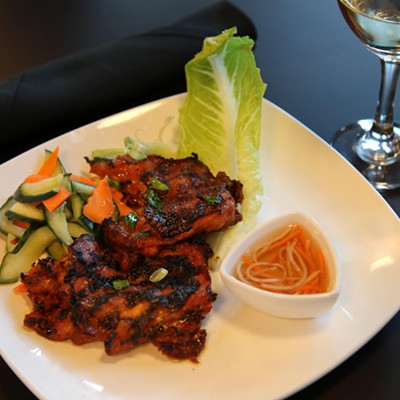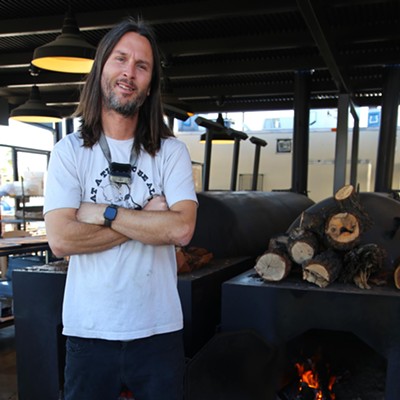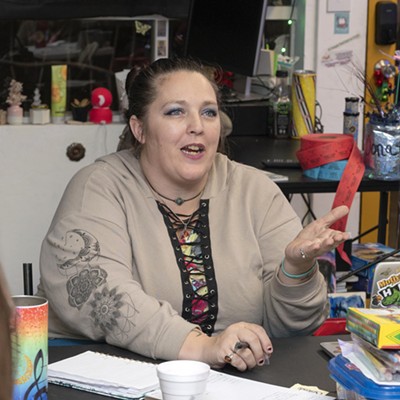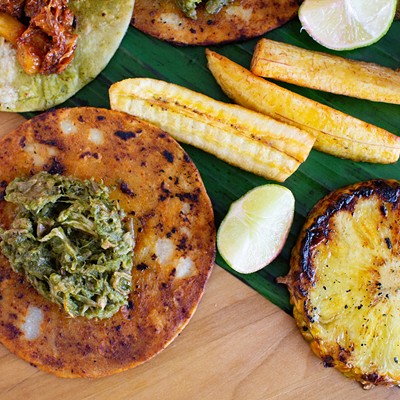Don Guerra says he's not just a baker. He is also an entrepreneur, an educator, a dad and an artist.
"On my palette, I have flour, water, salt and yeast," says Guerra as he rolls snakes of dough on wooden boards before moving them to a flour-covered table. He uses scissors to snip away at each loaf and create the wheat-flower shape that characterizes epi bread.
After he transfers the dough to the oven, Guerra hangs up the damp rolling cloths on a metal railing to dry at Barrio Bread's headquarters, kitchen and delivery center: Guerra's midtown home.
He was able to forgo the brick-and-mortar route because of a change to Arizona law in 2011. The Home Baked and Confectionary Goods Program allows bakers to sell homemade baked items commercially. Cream pies, cheesecakes or other items that contain "potentially hazardous" ingredients like animal products are not covered under the law, but bread is a-OK.
Close to 1,000 people registered within the first few months, and the number has almost doubled since then, says Diane Eckles, the chief of the Office of Environmental Health at the Arizona Department of Health Services.
About 130 home bakers are registered in Tucson.
"I think it's a very good program to get people back to work and get people into small business without the overhead," Guerra says. "People know I'm a skilled baker, but I pride myself on being an entrepreneur just as much."
Guerra's career as a baker started when he moved to Flagstaff after dropping out of college when his financial aid ran out. He landed a job at a bakery on his first day in town. Homemade bread had been a staple of his childhood, but never a future aspiration.
"I don't know what it was, but I knew I was going to do it for the rest of my life," Guerra says. "It just gave me this intense drive to learn, learn, learn."
Guerra read books on bread, took numerous bakery jobs, and eventually went back to school, at Paradise Valley Community College. He participated in a small-business development program that taught him the accounting, planning and marketing skills to open his first bakery, the Village Baker, in Flagstaff.
"I was really young, and learned a ton, mostly by mistakes and stress levels," says Guerra, who was 26 when the bakery opened.
He met the woman who would eventually become his wife while working. She would frequent the bakery every Thursday until they started dating.
The business grew, and Guerra took on a partnership. Soon, he was planning a new bakery in Ashland, Ore. Despite success on paper, the climate was too cold for him, and the larger the business got, the more Guerra focused on his employees and the administrative side.
"I was trying to manage everything, and I just got further away from the bread," Guerra says. So he and his wife moved back to Tucson to be closer to family and to escape the stress of the big-bakery business.
His return to the Southwest marked a seven-year hiatus from baking. Guerra graduated from the University of Arizona with an education degree in 2001 and started teaching health, physical education and math at Miles Exploratory Learning Center.
When Guerra got the itch to start baking again, he knew he would need to get back to the basics. The first piece of equipment he bought for the garage was a towering oven from Italy.
With a little help from his engineering-inclined father-in-law, he established separate heating and cooling units and ensured there would be enough power to run the appliances.
"It's bare bones—just make really good bread," Guerra says about his operation. "It's not about equipment. ... It's all technique."
Now, almost three years later, Guerra puts a half-ton of flour into the 600 to 800 loaves he bakes per week. He uses everything from heirloom grains specific to the area, like Sonoran wheat, to rustic spelt, which gives bread a nuttier flavor.
Guerra's secret weapon is burbling white goo—the mother culture. Guerra relies on this wild yeast and only uses store-bought yeast sparingly, like when he wants to lighten the signature tangy sourdough flavor.
But the unique taste comes at a cost. In order to make the live yeast needed for each day's batch of bread, he pours a bit of the mother into a giant plastic bin, and feeds the yeast water and flour in the evening. At 2 a.m., he rolls out of bed to check the progress, and to feed it one more time before morning.
"It's totally different from any baking product, because it's alive," Guerra says.
One mistake, and Guerra has a lot of apologies to make, because he sells almost every loaf of bread ahead of time through online orders. His customers meet him outside of schools and at the Plaza Palomino farmers' market, wallets in hand.
Guerra cycles through nearly 40 varieties, including his signature pain au levain loaf and the more-adventurous spicy jalapeño and sharp cheddar. His prices range from $4 to $6 per loaf, but he's yet to have a customer complain.
"I need the money to survive, because that turns my business, but that's not my motive for my business," Guerra says. "I'm never going to get rich doing what I do."
He prides himself on being a community-supported baker, who relies on his carefully built customer base and social outreach. He only has one other employee, who helps with packaging and distribution, and a few volunteer delivery drivers. Guerra intends to stay small until he gets the green light from his family to expand in the future.
"A lot of the way I do business now is about setting my priorities for family," Guerra says. Despite an estimated 80-hour work week, he still finds time to play in the cul-de-sac with his 7-year-old son and 9-year-old daughter.
"It's going to be more of an innovation center," Guerra says about potential future plans. "I'm going to find a way to tie in an educational setting with bread-making."
When the oven chimes, he carefully slides the epi bread out; the steaming brown crust crackles when it meets the cool air in the kitchen. He transfers the loaves to shelves where they cool.
When the rest of the batch is done, he slides epis, baguettes and round loaves into brown paper bags with the Barrio Bread stamp. The next stop: the customer.
"My signature is on every loaf of bread, because my hands are on it, start to finish," Guerra says.








